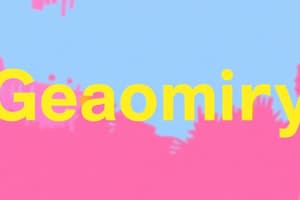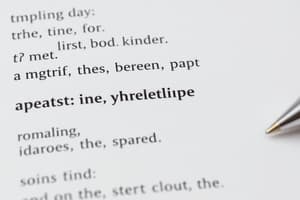Podcast
Questions and Answers
What does the word 'abstract' refer to?
What does the word 'abstract' refer to?
- A narrative style
- Concrete language
- A type of sentence structure
- Intangible ideas, emotions, conditions, or concepts (correct)
What is 'anaphora' in syntax?
What is 'anaphora' in syntax?
- The omission of conjunctions
- Repetition of the same word or group of words at the beginning of successive clauses (correct)
- A type of complex sentence
- A style of high diction
What is 'asyndeton'?
What is 'asyndeton'?
Deliberate omission of conjunctions in a series of related clauses.
What characterizes a balanced sentence?
What characterizes a balanced sentence?
Define 'chiasmus'.
Define 'chiasmus'.
What does 'colloquialism' refer to?
What does 'colloquialism' refer to?
Describe a complex sentence.
Describe a complex sentence.
What is a compound-complex sentence?
What is a compound-complex sentence?
What does 'concrete' refer to in diction?
What does 'concrete' refer to in diction?
Explain 'connotation'.
Explain 'connotation'.
What is a declarative sentence?
What is a declarative sentence?
What does denotation mean?
What does denotation mean?
Define 'dialect'.
Define 'dialect'.
What is 'diction'?
What is 'diction'?
What is an exclamatory sentence?
What is an exclamatory sentence?
What characterizes high diction?
What characterizes high diction?
What is an imperative sentence?
What is an imperative sentence?
Define an interrogative sentence.
Define an interrogative sentence.
What does 'inverted order' mean in syntax?
What does 'inverted order' mean in syntax?
Define 'jargon'.
Define 'jargon'.
What is 'juxtaposition'?
What is 'juxtaposition'?
What is considered a long sentence?
What is considered a long sentence?
Define a loose/cumulative sentence.
Define a loose/cumulative sentence.
What does low diction mean?
What does low diction mean?
What is a medium sentence?
What is a medium sentence?
Describe natural order in syntax.
Describe natural order in syntax.
What is neutral diction?
What is neutral diction?
What does parallel structure refer to?
What does parallel structure refer to?
Define a periodic sentence.
Define a periodic sentence.
What is 'polysyndeton'?
What is 'polysyndeton'?
What is repetition in syntax?
What is repetition in syntax?
What is a rhetorical fragment?
What is a rhetorical fragment?
Define a rhetorical question.
Define a rhetorical question.
What is considered a short sentence?
What is considered a short sentence?
What is a simple sentence?
What is a simple sentence?
Define 'syntax'.
Define 'syntax'.
What is 'zeugma'?
What is 'zeugma'?
Describe a telegraphic sentence.
Describe a telegraphic sentence.
Flashcards are hidden until you start studying
Study Notes
Vocabulary: Diction and Syntax
- Abstract: Language that denotes intangible ideas, emotions, conditions, or concepts.
- Colloquialism: Nonstandard linguistic expressions, often regional, used in informal speech or writing.
- Concrete: Specific words that describe observable qualities and conditions.
- Diction: Author's word choice aiming to convey effect, meaning, and evoke emotions.
- Denotation: Exact literal meaning of a word without emotional associations.
- Connotation: Implicit meanings of a word that include associations and emotional undertones.
- Dialect: A unique subgroup of a language characterized by its own vocabulary and grammatical rules.
- High Diction: Language that avoids slang, idioms, and colloquialisms, creating a formal tone.
- Jargon: Specialized terms used within a particular profession or field.
- Low Diction: Everyday language that includes common words, idioms, and contractions.
- Medium Diction: Standard language that may include contractions and clear vocabulary.
- Neutral Diction: Language without embellishments, maintaining clarity and simplicity.
Syntax: Sentence Structures and Techniques
- Anaphora: Repetition of the same word(s) at the start of successive clauses for emphasis.
- Asyndeton: Omission of conjunctions in a series of related clauses to create urgency or rhythm.
- Balanced Sentence: Structure where phrases or clauses have equal length or meaning.
- Chiasmus: Reversal of arrangement of ideas in the second clause for thematic contrast.
- Complex Sentence: Contains one independent clause and one or more subordinate clauses.
- Compound-Complex Sentence: Features two or more independent clauses alongside one or more subordinate clauses.
- Declarative Sentence: A sentence that states a fact or opinion.
- Exclamatory Sentence: Used to express strong emotions or to emphasize a point.
- Imperative Sentence: Gives a command or request.
- Interrogative Sentence: A sentence framed to ask a question.
- Inverted Order: Arrangement where the predicate comes before the subject.
- Juxtaposition: Placing unassociated ideas or phrases closely together for effect.
- Loose/Cumulative Sentence: Makes sense before reaching the end, often adding further information.
- Natural Order: Sentence structure where the subject precedes the predicate.
- Parallel Structure: Grammatical similarity between parts of a sentence or multiple sentences.
- Periodic Sentence: A sentence that is not complete until the final part is reached.
- Polysyndeton: Overuse of conjunctions to create emphasis and a flowing narrative style.
- Repetition: The strategic use of recurring words, sounds, or ideas for rhythm and emphasis.
- Rhetorical Fragment: A sentence fragment intentionally used for persuasive impact.
- Rhetorical Question: A question asked to make a point rather than to elicit an answer.
- Short Sentence: Consists of five to seventeen words.
- Simple Sentence: Contains only one independent clause.
- Telegraphic Sentence: Short sentences consisting of fewer than five words.
- Zeugma: A verb that governs two different meanings with objects that fit both.
Sentence Length Classifications
- Long Sentence: Contains thirty or more words.
- Medium Sentence: Between eighteen and twenty-nine words.
- Short Sentence: Five to seventeen words in length.
Studying That Suits You
Use AI to generate personalized quizzes and flashcards to suit your learning preferences.




